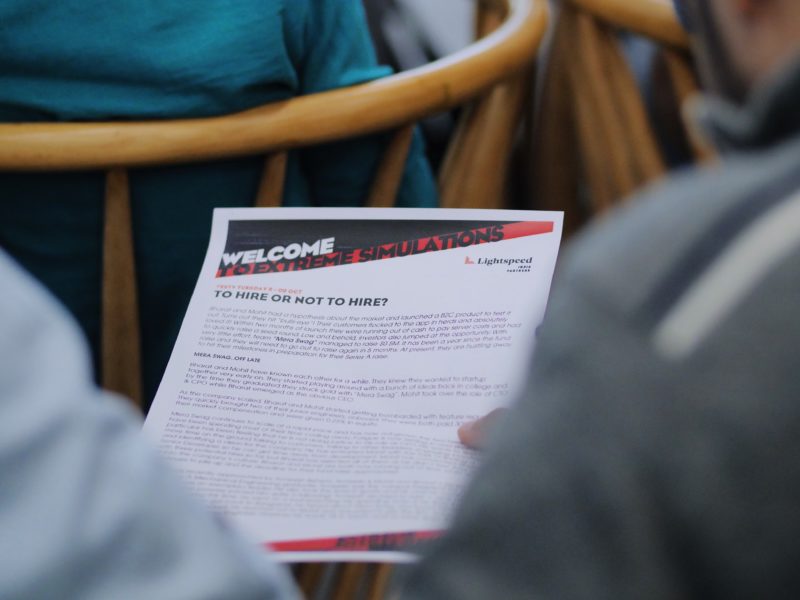Dheeraj Pandey (founder and CEO, Nutanix) shared in one of the masterclasses, “As a founder you need to be a dream merchant” and rightly so. Hiring is one of the most crucial responsibilities of a founder. But making a hiring choice is a tough one, especially during the early stages of a start-up when not everyone wants to join you and the people who do, might want significant equity.
At Extreme Entrepreneurs, the third simulation focussed on ESOPs, culture fit, alignment between co-founders and other such aspects related to hiring. The case study “Hire or not to hire” was the story of “Mera Swag” (fictional, of course) where the co-founders, Mohit and Bharat were on the opposite sides with respect to the decision on hiring Avneesh as a lead developer. Both of them had known Avneesh since college days where he was their senior, an all-rounder and an exemplary leader. However, Avneesh lacked in core professional experience post-graduation. He also demanded 1% of equity and no less than 30% of his market compensation. One of the co-founders was excited about Avneesh and believed he was just the kind of leadership that the company needed while the other co-founder struggled with reconciling Avneesh’s value addition with his compensation expectation.

After much deliberation and intense discussions, when the co-founders (selected from EE teams) finally got aligned on a plan of action, the situation became more extreme as Avneesh (Harsha herself!) walked into the room for negotiations! The simulation tested the founder’s ability to navigate difficult negotiations with a desirable candidate.
Here are some learnings on hiring decisions that were captured as shared by Harsha Kumar from Lightspeed, who led the session. Hope you find them useful!
- Treat your equity like gold
At early stages, founders tend to think that 1-2% is not a big chunk of equity to give away. For them, hiring a person with experience becomes more critical than losing equity. However, founders need to be very cautious and objectively balance equity compensation with the value that someone brings to the table. ESOPs are very useful as companies scale and more senior members need to be hired. The demand for equity will only rise. Treat it like gold and use it economically.
- Be quick to reward
If you find someone adding exceptional value to the company, be quick to reward. Don’t think of what others in the company might think of this decision. The culture in the company should be that of rewarding performance.
- Align on possible options beforehand
Before walking into a negotiation conversation with a potential hire, discuss and align on A-B-C plan among the co-founders so that everyone is on the same page. As depicted in simulation, it is often that co-founders have different perspective with respect to a hiring decision. Having clear strategies/options makes it easy for one of the promoters to take the lead and confidently make progress in a negotiation.
- Study the market
The salary or equity stake varies with industry, function, role and geography. Be sure to talk to the right people in order to have benchmarks in place before you make your offer. Leverage your investors for this purpose.
- Hire right than hire late
Often founders get overwhelmed with the urgency of a situation and rush to make a hire. Understand that a wrong hire is likely to slow you down – he might need more hand-holding, might have a negative impact on the team’s culture and drive. Spend some time thinking a few months ahead to predict who you might need in the future and start looking for that person today. If this cannot be done, get comfortable with re-defining your milestones. But aggressive goals with an average hire leading the charge simply cannot be the answer
- Keep numbers close to your chest
Harsha shared how she has seen smart founders beautifully dodge the question on confidential numbers of the company. Unless you trust the person completely and he/she is in the last few stages of the process, avoid sharing confidential data.



